Thanks to those who ordered some of the Lenten books I highlighted in the last post, or those who followed the links to some of the older Lent lists. A few of those books are very, very nice. Glad you are using them.
Yet, I want to ponder more, perhaps even help you prepare for Ash Wednesday and the whole lengthy season of Lent, my naming some other books that have been spotted as I’ve worked in the shop lately. I’m spending hours and hours (and hours) in our basement overstock area, sorting and pulling and packing for the upcoming Jubilee event, so I’m seeing lots of titles, handling them, wondering if I should take them there, or feature them in the store, or stack ’em for another event we’re doing in March. Some of this has been quiet and meditative, and I’ve been thinking about books that people might like to be reminded of here as we move towards Lent.
And so, a few that just seemed right to name. All are on sale. See what you think.
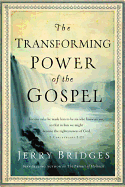 The Transforming Power of the Gospel Jerry Bridges (NavPress) $16.99 I read Bridges’ powerful collection of short studies on holiness years ago and became of fan of his no-nonsense, straight-up Christian teaching. Like some modern day Puritan with a heart for those who need clear explication, Bridges has given us solid book after book on the how the good news is good, even for our befuddled lives. That is, salvation isn’t just a free ticket to everlasting life, but it is a power–if we preach it to ourselves as Luther commended–to help us grow. This “gospel centered” approach is so very helpful and this new one explores the biblical meaning of grace, how Jesus’ work applies in justification and adoption, why basic spiritual disciplines are useful for growth, and how the Holy Spirit works in our lives for “progressive sanctification.” I will be the first to say that this particular way to teach Christian growth with this particular attention to the cross and the complete work of Christ, is only part of what the breadth of God’s Kingdom includes. But this is foundational, and way too few folks have this material deep in their bones. I commend it to you.
The Transforming Power of the Gospel Jerry Bridges (NavPress) $16.99 I read Bridges’ powerful collection of short studies on holiness years ago and became of fan of his no-nonsense, straight-up Christian teaching. Like some modern day Puritan with a heart for those who need clear explication, Bridges has given us solid book after book on the how the good news is good, even for our befuddled lives. That is, salvation isn’t just a free ticket to everlasting life, but it is a power–if we preach it to ourselves as Luther commended–to help us grow. This “gospel centered” approach is so very helpful and this new one explores the biblical meaning of grace, how Jesus’ work applies in justification and adoption, why basic spiritual disciplines are useful for growth, and how the Holy Spirit works in our lives for “progressive sanctification.” I will be the first to say that this particular way to teach Christian growth with this particular attention to the cross and the complete work of Christ, is only part of what the breadth of God’s Kingdom includes. But this is foundational, and way too few folks have this material deep in their bones. I commend it to you.
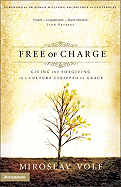 Free of Charge: Giving and Forgiving in a Culture Stripped of Grace Miroslav Volf (Zondervan) $12.99 You may know that we got to sell books for Volf earlier this year, so we now not only appreciate his books and recognize his importance as a writer and theological leader, but we are enthused about him. We get it. This book is just wonderful. How do we understand grace in a culture where we vote people off the island, where there is “no such thing as a free lunch” where every person has to watch their back because, sooner or later, Trump is going to get in your face and say “Your fired!”? Well, the gospel undoes all that, it is revolutionary, and in this graceless culture, being forgiven, and learning to forgive, is laden with implications. Archbishop of Canterbury Rowan Williams says of it “I cannot remember having read a better account of what it means to say that Jesus suffered in our place.” Wow.
Free of Charge: Giving and Forgiving in a Culture Stripped of Grace Miroslav Volf (Zondervan) $12.99 You may know that we got to sell books for Volf earlier this year, so we now not only appreciate his books and recognize his importance as a writer and theological leader, but we are enthused about him. We get it. This book is just wonderful. How do we understand grace in a culture where we vote people off the island, where there is “no such thing as a free lunch” where every person has to watch their back because, sooner or later, Trump is going to get in your face and say “Your fired!”? Well, the gospel undoes all that, it is revolutionary, and in this graceless culture, being forgiven, and learning to forgive, is laden with implications. Archbishop of Canterbury Rowan Williams says of it “I cannot remember having read a better account of what it means to say that Jesus suffered in our place.” Wow.
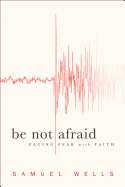 Be Not Afraid: Facing Fear With Faith Samuel Wells (Brazos) $17.99 I have much anxiety these days, and was struck—in a chapter in the new Lauren Winner memoir Still–how she “gave up anxiety for Lent” one year. This book invites us to “look deep into the questions of your life and deep into the heart of God.” We will discover that there is no need to be afraid. Wells is a powerhouse of a preacher (he is the dean of the chapel and professor of ethics at Duke University.) Jonathan Wilson-Hartgrove says that this is “delivered with the thoughtfulness of C.S. Lewis and the authenticity of Billy Graham.” This is exceptionally timely, given our place in history, and it’s blend of storytelling, Biblical interpretation and theological reflection makes it a prefect book to mull over, to read and re-read, to perhaps journal about. Are you in a small group? It would be great to talk over each sermon, struggling together with the messages so beautifully given, here.
Be Not Afraid: Facing Fear With Faith Samuel Wells (Brazos) $17.99 I have much anxiety these days, and was struck—in a chapter in the new Lauren Winner memoir Still–how she “gave up anxiety for Lent” one year. This book invites us to “look deep into the questions of your life and deep into the heart of God.” We will discover that there is no need to be afraid. Wells is a powerhouse of a preacher (he is the dean of the chapel and professor of ethics at Duke University.) Jonathan Wilson-Hartgrove says that this is “delivered with the thoughtfulness of C.S. Lewis and the authenticity of Billy Graham.” This is exceptionally timely, given our place in history, and it’s blend of storytelling, Biblical interpretation and theological reflection makes it a prefect book to mull over, to read and re-read, to perhaps journal about. Are you in a small group? It would be great to talk over each sermon, struggling together with the messages so beautifully given, here.
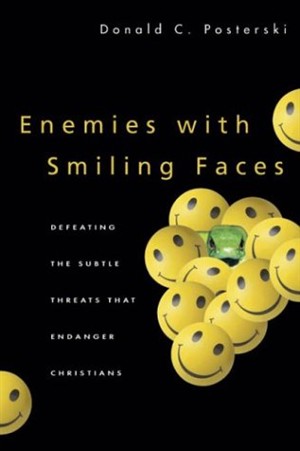 Enemies with Smiling Faces: Defeating the Subtle Threats That Endanger Christians Donald Posterski (IVP) $12.00 I’ve never warmed up to this cover –the smiley faces, you know. But that is the point. I’ve read a few of these chapters a couple of times, and they are rewarding with every take. What an important discipline during this season, to explore how things we may take for granted by be subtly eroding our faith and faithfulness. Some of the dangers, this Canadian professor and Christian leader tells us, come in the form of popular Christian concepts that are not sound. Such as a “quick fix faith” a “feeling only” faith. We can get caught up in what he calls “spiritual superiority.” Of course there is shallow character development from self-reliance, affluenza, or a privatized faith. Not only does he name these enemies of our soul, he has in about the last third of the book remarkable strategies for dealing with these pressures; as a staff with World Vision, Posterski knows well stuff about the globalized economy, religious pluralism and such. His advise is not shallow and it is not cheap. He calls us to be more willing to be critical of our culture, to stand firm in our public lives, and to be attentive to self care, soul care, even what he calls “social care.” This is an excellent, thoughtful book, which is more needed now then when it came out a few years ago.
Enemies with Smiling Faces: Defeating the Subtle Threats That Endanger Christians Donald Posterski (IVP) $12.00 I’ve never warmed up to this cover –the smiley faces, you know. But that is the point. I’ve read a few of these chapters a couple of times, and they are rewarding with every take. What an important discipline during this season, to explore how things we may take for granted by be subtly eroding our faith and faithfulness. Some of the dangers, this Canadian professor and Christian leader tells us, come in the form of popular Christian concepts that are not sound. Such as a “quick fix faith” a “feeling only” faith. We can get caught up in what he calls “spiritual superiority.” Of course there is shallow character development from self-reliance, affluenza, or a privatized faith. Not only does he name these enemies of our soul, he has in about the last third of the book remarkable strategies for dealing with these pressures; as a staff with World Vision, Posterski knows well stuff about the globalized economy, religious pluralism and such. His advise is not shallow and it is not cheap. He calls us to be more willing to be critical of our culture, to stand firm in our public lives, and to be attentive to self care, soul care, even what he calls “social care.” This is an excellent, thoughtful book, which is more needed now then when it came out a few years ago.
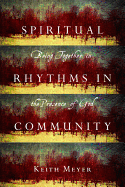 Spiritual Rhythms in Community: Being Together in the Presence of God Keith Meyer (IVP-formatio) $15.00 More than a year or so ago I raved about Meyer’s book Whole Life Transformation: Becoming the Change Your Church Needs which told the story of Meyer’s burn out while pastoring a very large, quite successful congregation. As you may guess, he discovered historic spiritual disciplines, learned some new ways to pray, set boundaries and priorities and became more attentive to contemplative spirituality. It was a great book, but this looks to be even better, and it is one a topic no less urgent: how to life our life with God as a community. This seems to work well the rhythm idea, and invites us to life-giving patterns in our days and weeks. He draws on Jesus, in fact, and with pastoral storytelling, helps us see how to be formed by God’s transforming Spirit, but, more, how to see God work in our congregations and groups. There are spiritual practices here designed for groups to experience together, some movies to watch or things to do, excellent meditations on the Psalms and group discussion questions. Mindy Caliguire calls him a “visionary practitioner.” Nice.
Spiritual Rhythms in Community: Being Together in the Presence of God Keith Meyer (IVP-formatio) $15.00 More than a year or so ago I raved about Meyer’s book Whole Life Transformation: Becoming the Change Your Church Needs which told the story of Meyer’s burn out while pastoring a very large, quite successful congregation. As you may guess, he discovered historic spiritual disciplines, learned some new ways to pray, set boundaries and priorities and became more attentive to contemplative spirituality. It was a great book, but this looks to be even better, and it is one a topic no less urgent: how to life our life with God as a community. This seems to work well the rhythm idea, and invites us to life-giving patterns in our days and weeks. He draws on Jesus, in fact, and with pastoral storytelling, helps us see how to be formed by God’s transforming Spirit, but, more, how to see God work in our congregations and groups. There are spiritual practices here designed for groups to experience together, some movies to watch or things to do, excellent meditations on the Psalms and group discussion questions. Mindy Caliguire calls him a “visionary practitioner.” Nice.
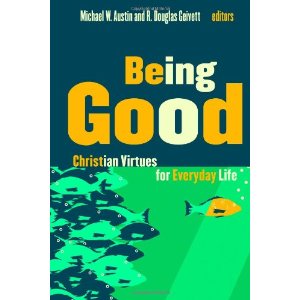 Being Good: Christian Virtues for Everyday Life edited by Michael Austin & Douglas Geivett (Eerdmans) $26.00 You may be hearing more about this this spring as it seems to be one of the big books from this prestigious publisher for this publishing season. Dallas Willard says it offers “outstanding contributions by frontline Christian thinkers and scholars” and is “a major contribution to the intellectual and spiritual needs of our time. There are eleven serous chapters, and each seem to be very nicely written, on different aspects of living a virtuous lifestyle. Specifically, they explore faith, open-mindedness, wisdom, zeal, hope, contentment, courage, love, compassion, forgiveness, and humility. There are discussion questions, too, to ponder or to use with a small group. Austin is a professor of philosophy and ethics at Eastern Kentucky University and Geivett is a philosophy prof at Biola. At 280+ pages, this is a very nice book.
Being Good: Christian Virtues for Everyday Life edited by Michael Austin & Douglas Geivett (Eerdmans) $26.00 You may be hearing more about this this spring as it seems to be one of the big books from this prestigious publisher for this publishing season. Dallas Willard says it offers “outstanding contributions by frontline Christian thinkers and scholars” and is “a major contribution to the intellectual and spiritual needs of our time. There are eleven serous chapters, and each seem to be very nicely written, on different aspects of living a virtuous lifestyle. Specifically, they explore faith, open-mindedness, wisdom, zeal, hope, contentment, courage, love, compassion, forgiveness, and humility. There are discussion questions, too, to ponder or to use with a small group. Austin is a professor of philosophy and ethics at Eastern Kentucky University and Geivett is a philosophy prof at Biola. At 280+ pages, this is a very nice book.
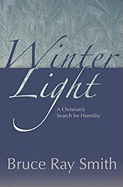 Winter Light: A Christians Search for Humility Bruce Ray Smith (Kalos Press) $12.95 I have mentioned this before, but it just seemed appropriate to highlight again. I’m so drawn to this, having spent wonderful time ruminating on the poetic entries, praying through this gentleman’s lines, reflecting on his good wintry effort to learn humility. Smith is a former literature prof, so he cites British poets and other fine authors, from Herbert to Milosz. He writes his journal entries with a fine cadence, never too heavy. He is a mature Christian, it seems, as he briefly tells of his own reading of authors as diverse as Fenelon and Edwards and Heschel it seems, as he knows the places in his own heart where he must allow God to chisel him away, to form and shape him. He wants more of God, he wants his heart to be right, his attitude to be reformed. Is it your own heart’s desire this season to allow God to mold you? Do you sometimes feel you may need some reminders about character, about humility, but not a whopping self help book? Would you like a finely-crafted set of short devotional-like entries, as you look over the shoulder of a good guide to the human condition? I’d recommend this short book, especially as a Lenten resource.
Winter Light: A Christians Search for Humility Bruce Ray Smith (Kalos Press) $12.95 I have mentioned this before, but it just seemed appropriate to highlight again. I’m so drawn to this, having spent wonderful time ruminating on the poetic entries, praying through this gentleman’s lines, reflecting on his good wintry effort to learn humility. Smith is a former literature prof, so he cites British poets and other fine authors, from Herbert to Milosz. He writes his journal entries with a fine cadence, never too heavy. He is a mature Christian, it seems, as he briefly tells of his own reading of authors as diverse as Fenelon and Edwards and Heschel it seems, as he knows the places in his own heart where he must allow God to chisel him away, to form and shape him. He wants more of God, he wants his heart to be right, his attitude to be reformed. Is it your own heart’s desire this season to allow God to mold you? Do you sometimes feel you may need some reminders about character, about humility, but not a whopping self help book? Would you like a finely-crafted set of short devotional-like entries, as you look over the shoulder of a good guide to the human condition? I’d recommend this short book, especially as a Lenten resource.
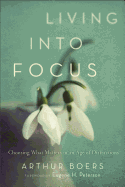 Living into Focus: Choosing What Matters in an Age of Distraction Arthur Boers (Brazos) $17.99 I have not started this yet at all, but have been anticipating it since I was in an on-line focus group (no pun intended) about the cover. See how it starts blurry, and moves into focus? Well, here is what I do know: I have read three or four other books by this Mennonite author (his book on the Lord’s Prayer is excellent, as is a book he did on hiking the El Camino trail.) I can easily commend him to you, knowing he is meaty, helpful, and a good writer. I also know this: Eugene Peterson wrote the foreword, and it is vintage, good stuff. Gene ends with this comment,
Living into Focus: Choosing What Matters in an Age of Distraction Arthur Boers (Brazos) $17.99 I have not started this yet at all, but have been anticipating it since I was in an on-line focus group (no pun intended) about the cover. See how it starts blurry, and moves into focus? Well, here is what I do know: I have read three or four other books by this Mennonite author (his book on the Lord’s Prayer is excellent, as is a book he did on hiking the El Camino trail.) I can easily commend him to you, knowing he is meaty, helpful, and a good writer. I also know this: Eugene Peterson wrote the foreword, and it is vintage, good stuff. Gene ends with this comment,
Most of us know far more about the Christian faith than we manage to live. There is no lack of words in the Christian community these days regarding spiritual formation finding ways to think adequately about the Father, Son, and Holy Spirit, and receiving all the operations of the Trinity. Arthur Boers takes all this a step further. He takes what we know into our neighborhoods and backyards, our homes and our workplaces. He then helps us get it all into our bones and muscles, our nerve endings and synapse as we drive our cars, use our computers, work our gardens, cook our meals, and eat together.
Peterson notes that this good book is a bit of an antidote to the way modern technology is impoverishing our way of life. Of course, Pastor Pete doesn’t just mean that we use email or drive fancy cars, he means the whole mindset of quick fixes and technique, of data rather than wisdom.
Peterson is perfect for this foreword and it may be that he was a connecting point between Boers and his project. Boers, you see, is drawing considerable on an idea in a book by a Montana Catholic philosopher, Albert Borgman, who Peterson knows well. Borgman has written about “focal practices” and invites us to rethink the ways we see and do life in our technologically complex American culture. It seems that Boers, the Mennonite author and pastor, is developing a spirituality in light of Borgman. In other words, he ends up a lot like Eugene Peterson. He doesn’t see faith as primarily internal or otherworldly, but a way of being in the world. We can use Borgman’s “focal” ways to help us discern God’s presence. The endorsements on the back of this are something –from Wendell Berry scholar Norman Wirzba to UCC pastor Lillian Daniel, from Baptist pacifist Lee Camp to, yes, Professor Borgman himself, who writes, with a lovely allusion to his own theory, and Boers use of it, “It’s one thing to clear a piece of land, move rocks, rake the soil, and protect it with a fence. It’s another to bring it to life with berry-bearing bushes, exuberant gardens, vigorous vegetables and many-colored flowers. It’s that second thing that Arthur Boers has done; he’s taken a theory and made it fruitful.” We are living in a culture of distraction. Lent might be a time to “pay attention.” I think this will help us focus on what really matters.
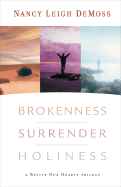 Brokenness / Surrender / Holiness Nancy Leigh DeMoss (Moody Press) $19.99 You may know Nancy DeMoss’s radio show “Revive Our Hearts.” Several years ago she released three small paperbacks, with the three titles shown above. This is a one-volume hardback which collects all three small books into one big one. Do you need a fresh encounter with God? Can you imagine deep repentance? Do you struggle with secret sin—surrender, she says, isn’t waving a white flag saying “I give up” but it means “victory at last.” I like that. Of course, Lent is a time to pursue holiness and her call here to purity and holiness will set your heart on fire. We have each of these in smaller paperbacks on this one hardback. She is a solid evangelical Bible teacher and touches the hearts of many. I wanted you to know we have her books, and invite you to consider them during this time of year.
Brokenness / Surrender / Holiness Nancy Leigh DeMoss (Moody Press) $19.99 You may know Nancy DeMoss’s radio show “Revive Our Hearts.” Several years ago she released three small paperbacks, with the three titles shown above. This is a one-volume hardback which collects all three small books into one big one. Do you need a fresh encounter with God? Can you imagine deep repentance? Do you struggle with secret sin—surrender, she says, isn’t waving a white flag saying “I give up” but it means “victory at last.” I like that. Of course, Lent is a time to pursue holiness and her call here to purity and holiness will set your heart on fire. We have each of these in smaller paperbacks on this one hardback. She is a solid evangelical Bible teacher and touches the hearts of many. I wanted you to know we have her books, and invite you to consider them during this time of year.
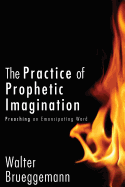 The Practice of Prophetic Imagination: Preaching an Emancipating Word Walter Brueggemann (Fortress) $25.00 If I could count on one hand my favorite people to list to, I’d have to say old Walt is up there. His books have been a consternation and a blessing to me, and his messages have perplexed and inspired me. I’ve read The Prophetic Imagination three entire times, and have dipped in to find quotes or useful pages on countless other occasions. Although it is not simple, many people mark a new understanding of the Scriptures, of their faith, of the calling of the church, by when they first read — or first began to get –The Prophetic Imagination. I devoured his Hopeful Imagination as well, another extraordinary book, on the post-exilic prophets, mostly. Now comes anothe
The Practice of Prophetic Imagination: Preaching an Emancipating Word Walter Brueggemann (Fortress) $25.00 If I could count on one hand my favorite people to list to, I’d have to say old Walt is up there. His books have been a consternation and a blessing to me, and his messages have perplexed and inspired me. I’ve read The Prophetic Imagination three entire times, and have dipped in to find quotes or useful pages on countless other occasions. Although it is not simple, many people mark a new understanding of the Scriptures, of their faith, of the calling of the church, by when they first read — or first began to get –The Prophetic Imagination. I devoured his Hopeful Imagination as well, another extraordinary book, on the post-exilic prophets, mostly. Now comes anothe
r one of the several books Brueggemann has done on preaching. For him, preaching has to do with nurturing a prophetic imagination, and it is done by drawing on–hosting, as he sometimes says–the complexity and tensions and poetic power of the Holy Scriptures. So, here ya go: a book about how to preach, in a way, a long-awaited follow up to The Prophetic Imagination and the Hopeful Imagination. Can we imagine that Yahweh really is an effective agent in the world? Is the triune God a God of emancipation? What do we say to help people find themselves in God’s story given the “contestation of narratives” in our age? Get chapter four, which is called “A Lingering Place of Relinquishment” if you want a Lenten reflection. Of, in Easter energy, perhaps, check out chapter five: “The Burst of Newness amid Waiting.” This is weighty, thick, full of what can only be called Brueggemann-esque vocabulary, rhetoric, cadences and passion.
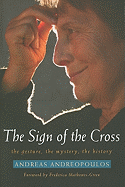 The Sign of the Cross: The Gesture, the Mystery, the History Andreas Andreopoulos (Paraclete) $16.99 I have a retired friend who has been in ministry for a lifetime and he told me this was his favorite book of all the books he read last year. Did you know that the sign of the cross is perhaps the earliest recorded Christian symbol, the earliest ritual practiced within the Body of Christ? This is a fascinating book with lots of historical detail blended with a reverential invitation to think about what the crossing of oneself means. I found myself wanting to be united with other believers in other times and places and found myself enjoying the bodily habit of doing this. Yet, I felt like it was drawing attention to myself; I’m a Presbyterian, for crying out loud, and we don’t do that custom. Yet this goes back to the earliest decades of the first disciples of the apostles. What a lovely little book, both informative and inspiring.
The Sign of the Cross: The Gesture, the Mystery, the History Andreas Andreopoulos (Paraclete) $16.99 I have a retired friend who has been in ministry for a lifetime and he told me this was his favorite book of all the books he read last year. Did you know that the sign of the cross is perhaps the earliest recorded Christian symbol, the earliest ritual practiced within the Body of Christ? This is a fascinating book with lots of historical detail blended with a reverential invitation to think about what the crossing of oneself means. I found myself wanting to be united with other believers in other times and places and found myself enjoying the bodily habit of doing this. Yet, I felt like it was drawing attention to myself; I’m a Presbyterian, for crying out loud, and we don’t do that custom. Yet this goes back to the earliest decades of the first disciples of the apostles. What a lovely little book, both informative and inspiring.
DISCOUNT
any book mentioned
2O% off
order here
takes you to the secure Hearts & Minds order form page
just tell us what you want
inquire here
if you have questions or need more information
just ask us what you want to know
